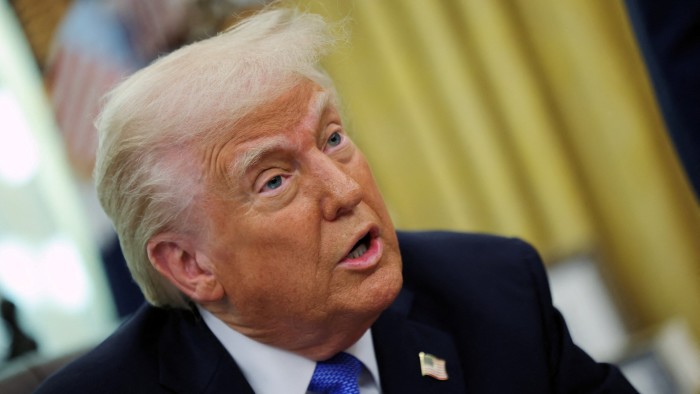Unlock the White House Watch newsletter for free
Your guide to what the 2024 US election means for Washington and the world
Donald Trump said the US would impose a 25 per cent tariff on all imports from any country that buys oil from Venezuela, a move that could roil crude markets and sharply raise levies on goods from China and India.
The announcement on Monday came days ahead of the president’s planned unveiling of a new tariff regime on US trading partners and amid a chaotic trade policy rollout marked by reversals and U-turns.
In a post on Truth Social, Trump said he was imposing the tariff for “numerous reasons”, alleging that “Venezuela has purposefully and deceitfully sent to the United States, undercover, tens of thousands of high level, and other, criminals, many of whom are murderers and people of a very violent nature”.
Venezuela exported 660,000 barrels a day of crude globally last year, according to consultancy Kpler, with the US, China, India, Spain and Italy among the top buyers. The US itself imported about 230,000 b/d from Venezuela in 2024, making the South American nation its third-biggest supplier.
The latest escalation of Trump’s trade war comes just days after Caracas agreed to begin receiving planeloads of deported migrants from the US, in a concession to the US president.
The move risks stoking turmoil in the oil market, something the White House has so far been keen to avoid in a bid to prevent supply disruption from raising petrol prices for American motorists. Brent crude rose 1.3 per cent following the announcement.
“If we see Venezuelan supply coming out of the market, that means less global supply, which means oil prices go up,” said Matt Smith, lead oil analyst at Kpler. “That gets passed on to prices of the pump, which is the opposite of President Trump’s goals.”
Trump referred to the unprecedented move as a “secondary tariff” and said it would take effect from April 2, which he has dubbed “liberation day”, when reciprocal levies on other countries will also come into force.
Analysts said countries were likely to cut imports rather than risk the tariffs. “We have never seen secondary tariffs but a literal interpretation of Trump’s Truth Social statement suggests it could lead to a significant disruption to Venezuelan exports,” said Fernando Ferreira, director of geopolitical risk at consultancy Rapidan Energy.
“Absent clarification from the administration on potential exemptions, I suspect most countries will self-sanction to avoid across-the-board tariffs on all exports to the US.”
Earlier this month, the US Treasury cancelled Chevron’s licence to operate in Venezuela, which is under broad sanctions, ordering the California-based oil group to wind down its operations within 30 days.
On Monday the Treasury extended the deadline for Chevron to wind down its oil production in the country until the end of May.
That licence allowed Chevron to export about 200,000 b/d last year, which Venezuela’s democratic opposition said went towards funding repression by President Nicolás Maduro’s government. Chevron declined to comment on Monday’s tariff announcement.
As part of Venezuela’s agreement to resume accepting deportees from the US, a flight carrying 199 people landed near Caracas on Sunday.
Trump has in recent weeks pushed to deport hundreds of alleged members of the Venezuelan Tren de Aragua gang, which the US has designated a terrorist organisation.
In his Truth Social post on Monday, the president referenced the gang and said Venezuela had been “very hostile to the United States and the Freedoms which we espouse”.
Earlier this month, the US deported some alleged gang members to El Salvador, where President Nayib Bukele had agreed to hold them in the country’s “very good jails at a fair price that will also save our taxpayer dollars”.
On Monday, the Department of Justice said it would deport three alleged Tren de Aragua members to Chile.
The Maduro government, which has often used the exodus of its citizens as leverage in negotiations with Washington, said that migrants had been “kidnapped” and sent to El Salvador.
Read the full article here

